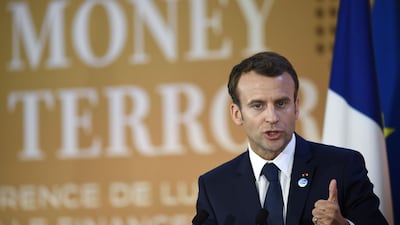French President Emmanuel Macron on Thursday threatened to name and shame countries that do not comply with international efforts to combat terrorist financing.
“It will be necessary to name when the time comes those who play the game and those who do not play it,” Mr Macron told representatives of more than 70 countries at the "No Money for Terror" conference in Paris.
The UAE was represented by Minister of State for Foreign Affairs Dr Anwar Gargash, who described the two-day meeting as "a renewed commitment to multilateralism".
"It is together, collectively, that we can perhaps eradicate, or at least reduce the global threat," Dr Gargash told the French media.
Among other participants at the meeting were US Treasury Secretary Steven Mnuchin, IMF chief Christine Lagarde, Saudi Foreign Minister Abdel Al Jubeir.
The event’s organisers were pushing for greater international transparency and co-operation regarding financial transactions, amid fears that terror groups may be using increasingly complex schemes to transfer funds and finance operations
The French president’s office noted that ISIS garnered an estimated $2.5 billion between 2014 and 2106 and that security services had identified 416 French donors to ISIS.
One French official suggested that some of this had been moved overseas since the collapse of ISIS's so-called caliphate over 2016-2017. "It has been moved since, at least in part. It's probably somewhere. These groups are very skilful in using sophisticated techniques to move financial resources around."
But he noted the relatively low cost of terror attacks carried out in Europe, citing French estimates that the attack on the Bataclan concert hall in November 2015 cost just 80,000 euros (Dh356,000), while the Charlie Hebdo attack earlier that year is estimated to have cost 25,000 euros.
_______________
Read more:
Qatar's protestations of innocence get more absurd by the day
Facebook reveals secret guidelines used to police extremist content
Arab ambassadors' letter warns on Qatar terror impunity
_______________
However, one expert questioned the effect of financial sanctions on the revenue streams of terror groups.
Peter Neumann, founding director of the International Centre for the Study of Radicalisation and Political Violence at King’s College London, warned against a focus on the international banking system to prevent terror funding.
“When it comes to countering terrorist finance, there has been an excessive, an exaggerated, an over the top focus on the formal financial sector,” he told the conference. “You need to follow the money. And most of it, especially in the case of Al Qaeda and ISIS, is not in the international financial system.
“Most of the transactions that ISIS has made have been in cash. We’ve been spending too much of our energy and effort looking for terrorist money in banks and international financial institutions.”
He also stressed the importance of defeating groups physically in order to combat their financing.
“When terrorist organisations hold territory, the way they make money changes.
“They start taxing people; they start selling resources. Oil, for example.
“Much of their money, in other words, comes from within the areas they control. It’s hard to cut them off from outside.
“Countering terrorist finance, in ISIS’s case, meant defeating them on the ground.”


